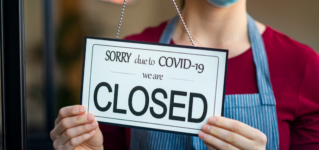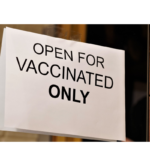Businesses Choose to Stay Closed Rather Than Discriminate

As Greater Sydney starts to open up this week, and a range of new public health orders come into force across the state, several businesses have chosen to remain closed until everyone is allowed entry, rather than refuse unvaccinated customers.
A Sydney barber shop closed its doors on Monday, just hours after reopening, after someone reported to CrimeStoppers that it was allowing entry to unvaccinated customers.
On its Facebook page, Walkabout Barber Enterprises in Warners Bay on the South Coast of New South Wales said that when Police attended the premises, they gave the owner and staff an ultimatum – either serve vaccinated customers only, or to close their doors until 1 December 2021 when all Australians, vaccinated or not, will be able to attend.
In a heartfelt social media post, the business owner explained his desire not to discriminate and chose the latter, saying “If you don’t stand for something, you will fall for anything.” His story has been widely supported.
A Sydney Cafe made a similar decision some weeks ago, saying it would only open its doors once the rules had relaxed, when all Australians could be treated equally.
Plenty of other already-struggling small businesses have followed suit, despite the financial impact.
Big retailers reject customers
The same can’t be said of the big multinational stores though, like Kmart, Best & Less and David Jones. Each of these companies has expressly stated that unvaccinated people are unwelcome.
Big Four bank NAB weighed in on the social debate some weeks ago too, with its ‘JAB’ rebranding which has been labelled by some as a pathetic attempt to appear socially conscious.
For small businesses though, it’s almost an extremely difficult situations. Those who choose to ignore the NSW Government’s new rules face a $5,000 fine, which is a considerable financial blow considering they have not been operational for the past 15 weeks.
There have been plenty of questions about whether the responsibility for the management of health policy should actually fall to business anyway, and small business (the majority of businesses in NSW) have expressed their concerns over a range of issues in relation to the new mandates, including having to make decisions about who can enter their premises, not having the money and resources to provide a dedicated staff member at the door to supervise ‘check-ins’ along with staff safety, should customers become disgruntled at the new rules.
Marginalised and discriminated against
Between now and 1 December 2021, those who are not vaccinated will just have to get used to being social pariahs. The coming weeks could signal the start of large corporations implementing policies with regard to staff too, which is another minefield that businesses must navigate.
Many workers in the Health and Emergency services sectors are already pushing back against Covid-19 vaccination mandates, either by quitting their jobs, or taking the matter to court.
It must be noted that the Federal Government stance has always been that vaccines are voluntary, and there is plenty of video footage floating the internet which shows Scott Morrison saying so.
While the NSW Government seems to believe that mandated vaccinations are the way to stop transmission, this view hasn’t actually been backed up by concrete health advice. Singapore is a case in point. Only days after reaching its 80% vaccination target, it recorded the highest number of delta cases it had ever experienced.
Deep social division
The vaccination was never designed to stop transmission, it was only ever designed to lessen the severity of the virus if contracted. And there are examples of people who have been fully – double-dose – vaccinated and who have subsequently tested positive for the virus.
An example of this is the Sydney woman who travelled to Northern New South Wales for work, and sent the Byron Bay region into lockdown in September. She had tested negative to the virus prior to leaving Sydney, and positive on arrival in Northern NSW.
With so much conflicting information, people should be excused for wanting to take their time to consider the vaccination for themselves. Yet they’re now being discriminated against for doing just that.
And, while it’s one thing to disagree with your neighbour over the fence, it’s another thing entirely to be turned away from retailers and other vital services, including medical care.
But the New South Wales Government continues to perpetuate its hardline stance, at the same time, ironically, as insisting that “we’re all in this together.”
In doing so, it has created a deep polarisation across the state which has not only turned neighbours against each other, but friends and families too, resulting in deep social divisions.
The unvaccinated people of New South Wales, and those who are champions of ‘pro-choice’ are now a marginalised group, discriminated against for no other reason that they exercised their civil right to freedom of choice.







